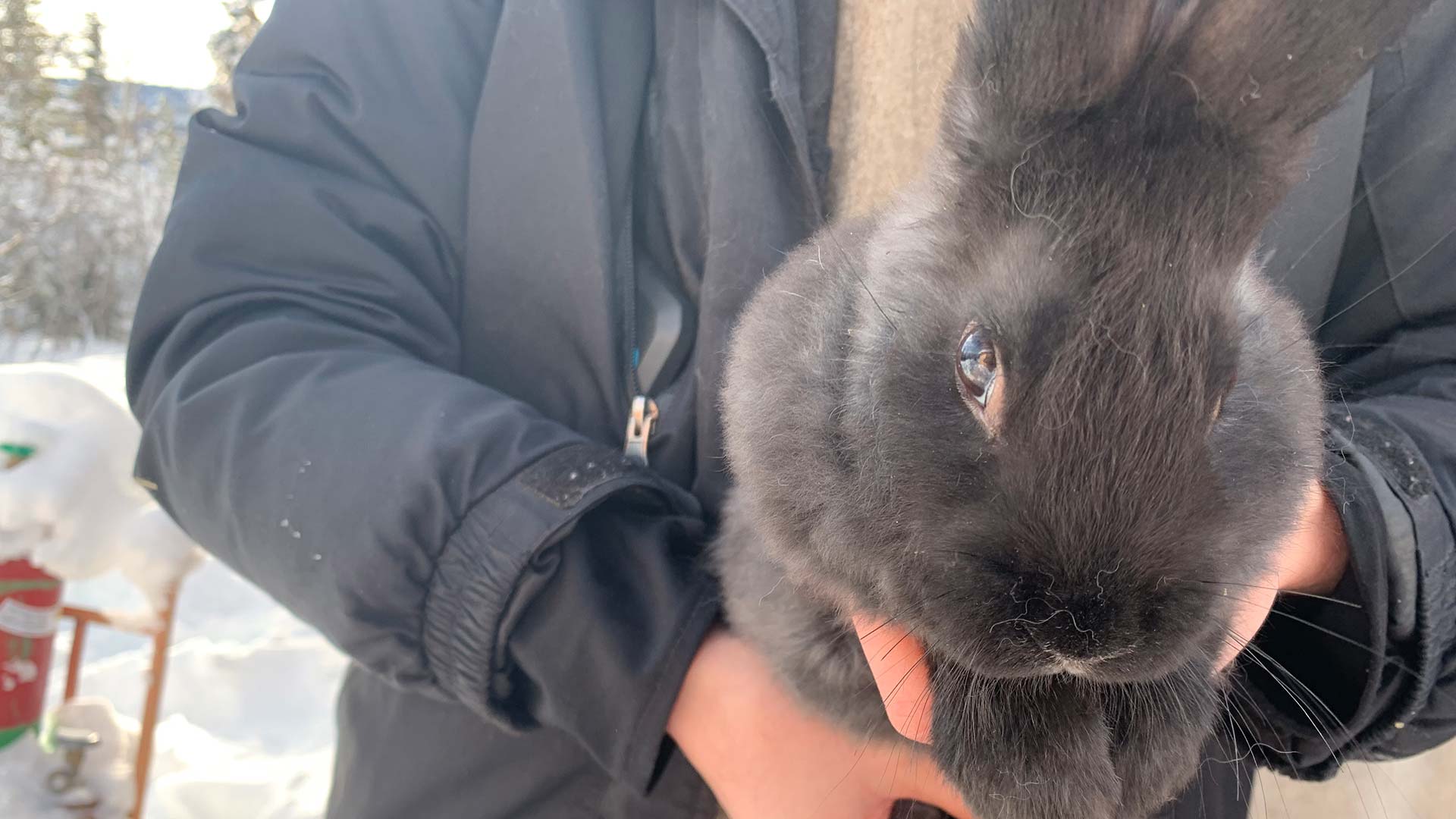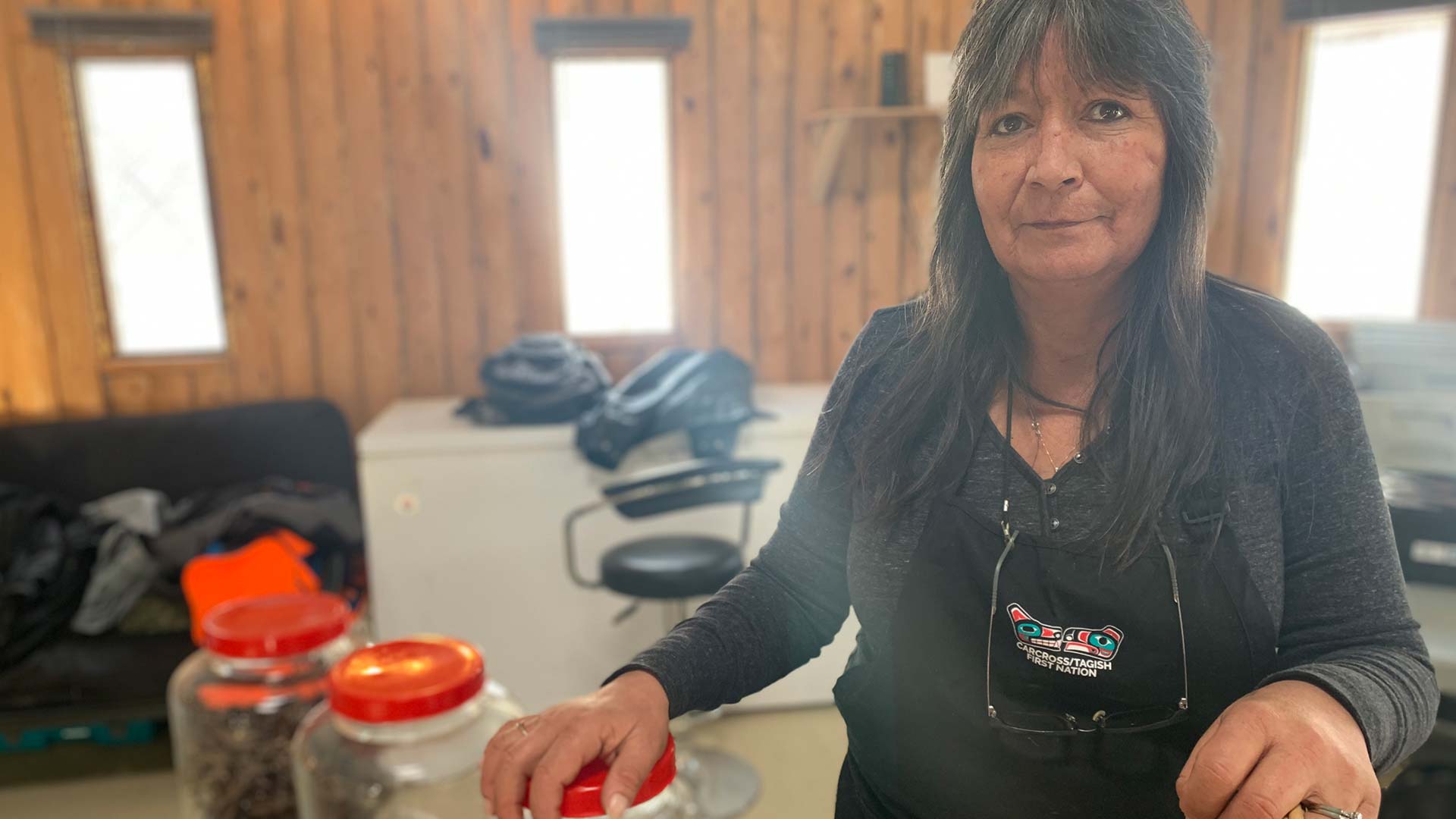A small First Nation’s farm just outside of Carcross, Yukon, has big plans to expand its enterprise.
The Carcross/Tagish First Nation (C/TFN) Farm has been in production for three years.
The 228 hectare (565 acres) farm produces its own eggs and meat.
Almost all of the food produced at the farm is given away to C/TFN citizens and local residents for free.
“We give it out to people on (social assistance), people with disabilities, we give to the daycare, to the school, to the learning centre for events if they’re having courses. We try to give some to everyone in some way or another,” C/TFN farm manager Kevin Bayne told APTN News.

There are currently around 50 egg-laying chickens; two sows – affectionally known as Betsy and Veronica – that are bred for their piglets; and about three dozen rabbits which are raised at the farm for their meat. Later this year there will also be 300 meat birds.
There are three fields on the property and an orchid that produces apples, pine nuts and haskap berries. There is also a structure on the farm grounds in the construction phase, which Bayne says will likely serve as an animal infirmary and office and living space for night caretakers.
And, it’s growing.
This year, the farm will purchase 300 meat birds, including 100 turkeys. Eventually, there will even be cattle.
Bayne hopes to soon install energy efficient biomass heaters in the chicken coups, as well as install solar panels.
“We’re going to hopefully get those this year. There was 15 citizens from Carcross that took a course learning how to hook up solar panels and we’re looking at getting them employment out here when we want to go that way” he says.
He also hopes to create employment opportunities for First Nations youth from across the Yukon at the farm.
“This year I want to get youth working out here between the ages of 18 to 29 where they can have a permanent position during the summer. We want to get youth who really want to be trained and want to work out here.”
C/TFN funds the farm, which costs roughly $25,500 dollars per year to feed the animals.
Five staff currently work there year round. Bayne is hopeful the farm will employ more citizens as it grows.
The C/TFN farm is an extension of a community garden in Carcross, which started in 2005.
The garden has two greenhouses and grows organic vegetables, like carrots, turnips and the much-coveted Lingít K’úntsx, or Tlingit potato, as well as herbs and spices.
Traditional medicines and tobacco are also grown at the garden for healing and ceremonial purposes.
A recent language revitalization project at C/TFN includes translating the names of each crop into Tlingit.

Everything produced at the farm and garden is fresh and organic, something that Bayne sees as a plus in the community as he says some elders are experiencing instances of cancer and diabetes.
“We’re looking at just having grain-fed animals, no chemicals or anything added to (the animal’s diet) to help (elders) be more healthy.”
Bayne says the farm and garden are also a source of food security for the community. In 2012, parts of the Alaska highway washed out, leaving grocery shelves bare.
“All the stores in Whitehorse had no produce or anything on any of the shelves, and meanwhile out here the elders and people on (social assistance), they were all getting fresh vegetables everyday,” he says.
Every Thursday, C/TFN citizens and local residents are welcome to visit the farm’s meeting building and learn how to properly can foods like vegetables and moose meat.
Donna Wolfe is a C/TFN citizen and ecological environmental monitor for C/TFN, and often teaches canning at the farm. She also runs workshops at the learning centre using produce and meat that was produced at the farm.
She says the farm has been helpful in reconnecting C/TFN citizens with traditional practises, like knowing how to properly preserve and store traditional meats and vegetables.
“Some people were uprooted and taken to the cities and never learned about the culture,” she says.
Wolfe is also a chartered herbalist and makes traditional medicines using plants and vegetables that were grown at the community garden. The medicines are free to anyone who needs them, First Nations or not.
“In the past, we didn’t have doctors coming up and down the highway. We didn’t have nurses, we didn’t have pills. Our elders found ways and medicines from the land to help, and they’re all-natural. The creator gave it to us free, why take it from the bush, or nature, and go make money from it?”

Wolfe says herself and other farm workers have a balsam tea infused with caribou leaves on standby for COVID-19 patients made with ingredients from the garden.
“What we do for colds and when people are sick is we boil balsam bark. What it does is make you sweat all your impurities out of your body. It’s really good for flus and colds,” she says.
Wolfe says elders are thankful for the food and medicines produced at the farm and garden.
“What they like about it is it’s organic, not store bought, but grown here. There’s no monosodium glutamate or anything. They (don’t have to worry) about porkchops, fish, moose steaks, moose burger, moose stew.”
While Bayne says operating the farm is fairly cost- efficient, he admits there can be challenges raising livestock north of 60.
“Wintertime is when it’s really tough, especially after this cold snap. If you don’t have the right watering pails and stuff like that it’s constantly freezing up on you. You got to be knocking ice off of (the pails) every day.”
Bayne says ultimately anyone is welcome to visit the farm, so they can learn what it’s all about
“Fresh food for the people and citizens who want it.”
Editor’s Note: The story originally said that the operational cost of the farm per year was $25,500 dollars plus staff salaries. The farm notified APTN News to say that this was only the cost of the feed. The farm did not want to disclose the costs of running the farm.









